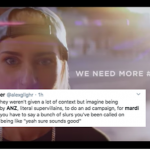Content warning: the following article contains descriptions of domestic violence.
Yesterday morning, a car caught on fire. It had three children and their parents in it. The woman jumped from the car screaming that the man poured petrol on her. Her skin was falling off. The man got out of the car too, angry at people trying to help her. He had stabbed himself.
They all died.
The children were younger than seven.
If you were presented with these facts, you would say it looks like a murder. You might say that the father lit the car on fire to kill his ex-partner and their children, and then killed himself. Something like that would be an act of domestic violence.
So why does Australian media have such a difficult time reporting it as such?
What is our tipping point for saying ENOUGH IS ENOUGH? When do we make family violence a national priority? How many more murders like that of #HannahBaxter do we need before action follows?
— Dr Kirstin Ferguson (@kirstinferguson) February 19, 2020
Hannah Baxter and her three children, Lainah, Aaliyah, and Trey were murdered by Rowan Baxter. He had a history of domestic abuse and Hannah had been desperately trying to get away from the relationship.
Yet the headlines tell of an ex-NRL player who died with his family in tragic circumstances.
They talk about how he was such a good guy. That his Facebook was littered with photos of his children, captions expressing his love for them. In many reports, Hannah and the children aren’t even named, with Hannah being referred to only as “Rowan Baxter’s ex-partner.”
Imagine condensing a woman’s entire life into the relationship she had with her murderer.
Don’t forget this government defunded some of the most critical frontline service supports for women and families experiencing domestic violence.The leadership of this country and perpetration of violence by men is what killed three children and their sacred mother. #HannahBaxter
— Nessa Turnbull-Roberts (@TurnbullVanessa) February 19, 2020
The media has a responsibility to Hannah, Lainah, Aaliyah, and Trey. They have shown sympathy to a man who murdered his family and dehumanised Hannah and her children by not naming them. Why are we not hearing about the lengths and sacrifices Hannah took to protect her young children from an abusive man?
OurWatch’s guidelines for reporting on domestic violence emphasise the huge role the media plays in how the public view these acts. Nearly all of the pieces covering Rowan’s violence do not meet these guidelines.
THE ACTUAL FU*K why do the overwhelming majority of headlines about the murder of #HannahBaxter and her children NOT EVEN MENTION HER but mention the man who set them all on fire??????? pic.twitter.com/tP88yPOHJu
— stary cat (@wronghalfjew) February 19, 2020
They fail to name domestic violence, trivialising it as domestic dispute.
Articles focus on the killer’s career and hobbies, how much of a “good bloke” he was, and make suggestions that there might have been other factors leading up to the violence, as if these are valid reasons for it.
They talk about how a woman and three children died in a car fire, instead of making it clear that someone killed them, taking responsibility away from the perpetrator. The ambiguity of the reporting suggests that this could have been an accident. We know better.
There are men abusing women and children all over Australia, from rich suburb to poor. Those women today are reading the news of #HannahBaxter and fearing it might be them next. And the thing is, one of them will be right.
— Clementine Ford ?♀️ (@clementine_ford) February 19, 2020
Nine women and eight children have been murdered so far in 2020, most of them killed by men. A woman and child are being murdered about every six days. If coronavirus was killing Australians at that rate, the media would recognise how important it is to tell the truth.
So why aren’t they now?
A fundraiser for the funerals of Hannah, Lainah, Aaliyah, and Trey is being arranged by their family. You can donate here.
For domestic violence support, please don’t hesitate to reach out. This is a difficult time for survivors.
1800 Respect national helpline: 1800 737 732
Women’s Crisis Line: 1800 811 811
Men’s Referral Service: 1300 766 491
Lifeline (24 hour crisis line): 131 114
Relationships Australia: 1300 364 277
NSW Domestic Violence Line: 1800 656 463
Qld DV Connect Womensline: 1800 811 811
Vic Safe Steps crisis response line: 1800 015 188
ACT 24/7 Crisis Line: (02) 6280 0900
Tas Family Violence Counselling and Support Service: 1800 608 122
SA Domestic Violence Crisis Line: 1800 800 098
WA Women’s Domestic Violence 24h Helpline: 1800 007 339
NT Domestic violence helpline: 1800 737 732
Image Sources: Twitter




